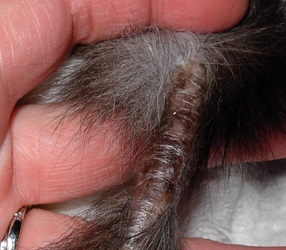Don't Be a Silent Witness: Report Abuse and Neglect
"Never be afraid to do what's right, especially if the wellbeing of a person or animal is at stake. Society's punishments are small compared to the wounds on our soul when we look the other way." Martin Luther King, Jr.
"Never be afraid to do what's right, especially if the wellbeing of a person or animal is at stake. Society's punishments are small compared to the wounds on our soul when we look the other way." Martin Luther King, Jr.
Punkie, an abandoned pet, was tormented by neighborhood kids. They tied a string around her tail so tightly, the fur can no longer grow there. Her ear was injured, her leg broken. People knew. Some likely were horrified. But no one reported it, so the abuse continued.
Have you driven by a dog who's kept outside all the time, in the blistering heat and frigid cold?
Have you watched someone hit, kick or otherwise hurt an animal--domestic or wild--or abuse a vulnerable human?
Have you seen an animal or infant in a locked car on a hot day, windows closed or cracked just a little?
Don't wait for someone else to step in; an innocent life could be irreparably harmed or even ended by the time that happens. The animal abuser could also "graduate" to hurting helpless people, like children or frail elders. In some cases, that's already happening. There is a direct link between abuse of animals and abuse of humans.
Take steps to stop cruelty and neglect. Wishing won't make it go away. Posting "poor kitty" on Facebook or Twitter won't help the victim. Only your action will.
Have you driven by a dog who's kept outside all the time, in the blistering heat and frigid cold?
Have you watched someone hit, kick or otherwise hurt an animal--domestic or wild--or abuse a vulnerable human?
Have you seen an animal or infant in a locked car on a hot day, windows closed or cracked just a little?
Don't wait for someone else to step in; an innocent life could be irreparably harmed or even ended by the time that happens. The animal abuser could also "graduate" to hurting helpless people, like children or frail elders. In some cases, that's already happening. There is a direct link between abuse of animals and abuse of humans.
Take steps to stop cruelty and neglect. Wishing won't make it go away. Posting "poor kitty" on Facebook or Twitter won't help the victim. Only your action will.
Every day you delay could mean the difference between life and death to an abused or neglected animal.
BE AN EVERYDAY HERO: WHAT YOU CAN DO NOW
Whenever you witness abuse or neglect, call authorities--the police or animal control officer. Contact your local SPCA too. Keep calling until there is a response. In the case of an animal or infant in a sealed car on a hot day, don't leave until authorities arrive.
Write down the name of the person to whom you report abuse or neglect, and contact him or her periodically to make sure action has been taken. Don't drop the ball or let the authorities drop it! Animals and vulnerable humans can't advocate for themselves; they depend on you.
Keep notes of what you see and hear, including the date, time and location of the abuse or neglect. Describe the animals and people involved.
Also take pictures or video if you can. This kind of evidence can be the tipping point for an investigation and help secure a conviction.
Know the animal cruelty laws in your state. You can call your state (not US) lawmakers or go to the legislature's website to search local laws. Or click here. And here's another good site.
If you have a neighbor who isn't cruel but is neglectful, you might start by talking with him or her. Keep it low-key, not accusatory; some people just need to be educated. Don't let neglect go on too long, however. A defenseless animal or person could suffer--or die--while you delay.
Report devocalization performed on dogs and cats in Massachusetts--it's been illegal there since 2010. The law, sponsored by Coalition to Protect and Rescue Pets, makes it a crime for anyone, including vets, to perform this dangerous, inhumane convenience surgery; for anyone to have it done to a dog or cat; and to sell a devocalized animal without prior written disclosure to the buyer.
Copyright © 2015 Coalition to Protect and Rescue Pets. All Rights Reserved.
BE AN EVERYDAY HERO: WHAT YOU CAN DO NOW
Whenever you witness abuse or neglect, call authorities--the police or animal control officer. Contact your local SPCA too. Keep calling until there is a response. In the case of an animal or infant in a sealed car on a hot day, don't leave until authorities arrive.
Write down the name of the person to whom you report abuse or neglect, and contact him or her periodically to make sure action has been taken. Don't drop the ball or let the authorities drop it! Animals and vulnerable humans can't advocate for themselves; they depend on you.
Keep notes of what you see and hear, including the date, time and location of the abuse or neglect. Describe the animals and people involved.
Also take pictures or video if you can. This kind of evidence can be the tipping point for an investigation and help secure a conviction.
Know the animal cruelty laws in your state. You can call your state (not US) lawmakers or go to the legislature's website to search local laws. Or click here. And here's another good site.
If you have a neighbor who isn't cruel but is neglectful, you might start by talking with him or her. Keep it low-key, not accusatory; some people just need to be educated. Don't let neglect go on too long, however. A defenseless animal or person could suffer--or die--while you delay.
Report devocalization performed on dogs and cats in Massachusetts--it's been illegal there since 2010. The law, sponsored by Coalition to Protect and Rescue Pets, makes it a crime for anyone, including vets, to perform this dangerous, inhumane convenience surgery; for anyone to have it done to a dog or cat; and to sell a devocalized animal without prior written disclosure to the buyer.
Copyright © 2015 Coalition to Protect and Rescue Pets. All Rights Reserved.



